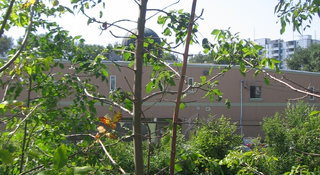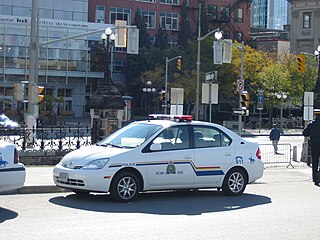Related Research Articles
Maher Arar is a telecommunications engineer with dual Syrian and Canadian citizenship who has resided in Canada since 1987.

The Canadian Security Intelligence Service is Canada's primary national intelligence agency. It is responsible for collecting, analysing, reporting and disseminating intelligence on threats to Canada's national security, and conducting operations, covert and overt, within Canada and abroad. The agency also reports to and advises the minister of public safety on national security issues and situations that threaten the security of the nation.

Giuliano Zaccardelli is an Italian-born Canadian retired police officer who served as the 20th commissioner of the Royal Canadian Mounted Police (RCMP) from 2000 to 2006. His departure from the RCMP was linked to the force's involvement in the Maher Arar affair. Zaccardelli was later impugned during inquiries into irregularities in the management of the RCMP's pension and insurance fund. He subsequently became a senior official with Interpol in Lyon, France, heading its OASIS Africa program, which aims to help African police forces more effectively combat international crime.

Abdullah Almalki is a Canadian engineer who was imprisoned and tortured for two years in a Syrian jail after Canadian officials falsely indicated to the Syrian authorities and other countries that he was a terrorist threat.
The Khadr family is an Arab-Canadian family noted for their ties to Osama bin Laden and connections to al-Qaeda.

Omar Ahmed Said Khadr is a Canadian citizen who at the age of 15 was detained by the United States at Guantanamo Bay for ten years, during which he pleaded guilty to the murder of U.S. Army Sergeant 1st Class Christopher Speer and other charges. He later appealed his conviction, claiming that he falsely pleaded guilty so that he could return to Canada where he remained in custody for three additional years. Khadr sued the Canadian government for infringing his rights under the Charter of Rights and Freedoms; this lawsuit was settled in 2017 with a CA$10.5 million payment and an apology by the federal government.

Abdullah Ahmed Said Khadr is a Canadian citizen who is the oldest son of the late Ahmed Khadr.
The RCMP Security Service was a branch of the Royal Canadian Mounted Police (RCMP) that had responsibility for domestic intelligence and security in Canada. It was replaced by the Canadian Security Intelligence Service (CSIS) in 1984 on the recommendation of the McDonald Commission, which was called in the wake of major scandals during the 1970s.
Ahcene Zemiri, also known as Hassan Zumiri, is an Algerian citizen who was for seven years a legal resident of Canada, where he lived in Montreal. He and his Canadian wife moved to Afghanistan in July 2001. They were separated when trying to leave in November 2001 and Zemiri was arrested and turned over to United States forces. He was transferred to the United States Guantanamo Bay detention camp in 2002, where he was detained for eight years without charge.
Integrated National Security Enforcement Teams are Canadian counter-terrorist, counter-foreign interference and counter-espionage security forces operating under the auspices of Public Safety Canada. These federal investigative teams, formed in 2002 in response to the September 11 attacks with members from the Royal Canadian Mounted Police (RCMP), Canada Border Services Agency (CBSA), Citizenship and Immigration Canada (CIC), Canadian Security Intelligence Service (CSIS), and police forces at the municipal and provincial levels, are tasked with investigating criminal national security matters domestically and internationally. INSET teams are operating in Toronto, Vancouver, Ottawa, Montreal and Edmonton.
Luc Portelance is the former president of the Canada Border Services Agency (CBSA). From 1979, he worked for the Royal Canadian Mounted Police (RCMP). From 1982, he worked for the RCMP Security Service in Quebec Region. From 1984 to 2009, he was a Canadian Security Intelligence Service (CSIS) officer. He was deputy director general in charge of the Counterintelligence Branch, director general for the Quebec Region, and assistant director. From 2007 to 2009, he was CSIS deputy director for operations under Jim Judd; succeeding Jack Hooper, who did not get along with Director Jim Judd. From August 2008, he was CBSA executive vice president.
Jim Gould was an intelligence officer who also served as a deputy at the Canadian Department of Foreign Affairs and International Trade.

A Canadian captured by American forces in Afghanistan at the age of 15, Omar Khadr is currently on interim release from prison in Canada pending an appeal of his war-crimes conviction before a military commission in Guantanamo Bay. Formerly the only Western citizen remaining in Guantanamo, Khadr is unique in that Canada refused to seek extradition or repatriation despite the urgings of Amnesty International, the Canadian Bar Association and other prominent organisations. His lawyer Dennis Edney has summarised the differential response towards Khadr stating that "one of the problems" with defending the youth is that he's a member of the Khadr family rather than "a Smith or an Arar"

The Salaheddin Islamic Centre is a mosque located in the Scarborough district of the city of Toronto, Ontario, Canada noted for its outspoken Imam Aly Hindy.
Founded in 2001, Project O Canada was a Toronto-based anti-terrorism investigation by the Royal Canadian Mounted Police. Created in response to the September 11, 2001 attacks, subdivisions of the project named A-O Canada and C-O Canada were based in Ottawa and Montreal, RCMP Divisions A and C respectively. By December 2001, the RCMP was shifting its focus from gathering intelligence, to seeking information "in a manner suitable for court purposes".
An Egyptian resident of British Columbia, Essam Hafez Mohammed Marzouk arrived in Vancouver, British Columbia, Canada in 1993 as a refugee fleeing persecution in Pakistan. He was one of 14 people subjected to extraordinary rendition by the CIA prior to the 2001 declaration of a war on terror.

In the ten days immediately following the September 11 attacks in the United States in 2001, the Royal Canadian Mounted Police (RCMP) initiated Project Shock which sought to quickly collect and act on any information or rumors related to possible threats posed by Muslims in Canada.
Richard Proulx is a former Royal Canadian Mounted Police (RCMP) Assistant Commissioner. He was the head of national security investigations at RCMP headquarters in 2003 during the "Maher Arar Affair".
The National Intelligence Coordination Centre is a branch of the Royal Canadian Mounted Police that deals with online threats. It was created in 2013 and deals with online crimes at home and abroad. It also monitors terrorist groups or protestors who might sabotage infrastructure.
References
- ↑ Canadian Press (2007-08-18). "CSIS Suspected Arar Could Face Torture: Documents". metronews.ca. Archived from the original on 2011-05-22.
- ↑ The RCMP and CSIS: Background Archived 2008-06-29 at the Wayback Machine
- 1 2 Shephard, Michelle (2008). Guantanamo's Child. John Wiley & Sons.
- 1 2 Colin Freeze, "Jack Hooper, former CSIS deputy director, dies at 57", The Globe and Mail, 12 November 2010 (accessed 13 November 2010).
- ↑ Eulogizing a life of secrets November 18, 2010 National Post Tyler Anderson
- 1 2 3 Michelle Shephard, "Ex-top spy breaks silence", Toronto Star, 26 May 2007 (accessed 29 September 2007).
- ↑ "CSIS Suspected Arar Could Face Torture: Documents", Canadian Press, 10 August 2007.
- ↑ Doyle, Simon (2006-10-02). "CSIS didn't want Arar returned to Canada". The Hill Times . Retrieved 2007-08-21.